"Prices have to be lowered, more cash must be put into the transaction in the form of a down payment or to buy down the interest rate in order to qualify for the same house price," said Hanson. "Buyers must switch to a lower-rate, higher-leverage ARM (adjustable rate) loan, which is much tougher to qualify for through the Fannie, Freddie and FHA systems, meaning much greater denials/fall-out; or the deal must simply be canceled."
Hanson is particularly concerned about cancellations among the home builders.
(Read More: Home Builder Sales at Risk Due to Rising Mortgage Rates)
Buyers of new construction often sign contracts for homes that will not be delivered for three to nine months, and therefore the buyers do not lock in mortgage rates at the time of purchase. A buyer who signed a deal the first week in May without a mortgage is now facing a far higher potential monthly payment, perhaps an unaffordable one.
The hangover effect could be much like the drop in home sales after the expiration of the home buyer tax credit. Prices dropped as well. This, as millions more borrowers were finally coming out from underwater on their loans, thanks to increased home equity. The number of borrowers owing more on their mortgages than their homes are currently worth fell by 47 percent in the first three months of this year from a year ago, according to Lender Processing Services. Some 7.2 million mortgages are still underwater, but that's down from a high of 17 million in 2011.
Increased home equity has helped to push mortgage delinquencies down. They dropped 15 percent in May from Jan. 1, the biggest drop in 11 years, according to LPS. If home price gains stall or if prices turn lower, that trend will reverse. Rising home equity has allowed more borrowers to sell homes they don't want or can't afford.
(Read More: Map: Tracking the US Real Estate Recovery)
While home sales may surge in the short term on fears of rising rates and falling affordability, the longer term may be a different story. One telling sign from the Fannie Mae survey, 56 percent of respondents expect rents to rise. That's up 8 percentage points in one month to a survey high.
—By CNBC's Diana Olick. Follow her on Twitter @Diana_Olick or on Facebook at facebook.com/DianaOlickCNBC.
Questions? Comments? RealtyCheck@cnbc.com.




